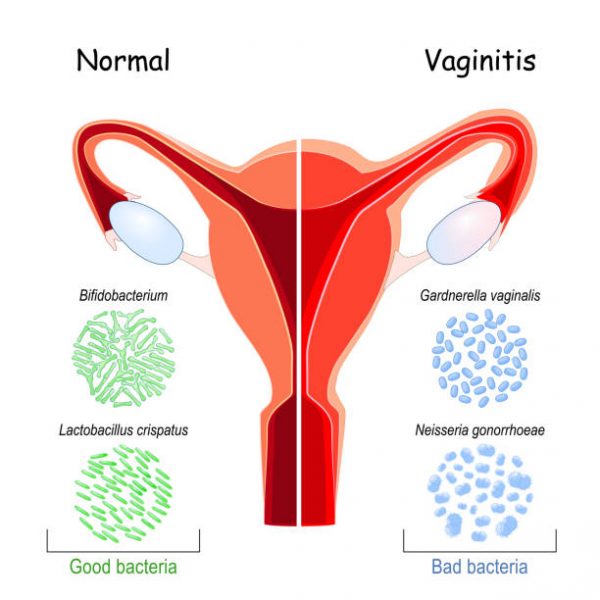+Your vagina can become irritated because of infections caused by sexually transmitted parasites, bacteria or viruses. The most common STIs that cause vaginitis are trichomoniasis, chlamydia and viral vaginitis.

For any Assistance
08504810692
H no 6 Agrawal Bhawan opp petrol pump ,Jawahar nagar Kota
Mon – Sat 11:00 AM – 02:30 PM
05.00 PM – 08:00 PM
Sunday – closed
Vaginitis
VAGINITIS
It is the infection and inflammation of vagina. It is very common during childhood, as there is lack of estrogen, estrogenic vaginal defense is lost, and infection occurs easily. The most common cause of vaginitis during reproductive age group is infection by microscopic organisms.
Trichomonas vaginitis is caused by organism Trichomonasvaginalis. There is sudden profuse and offensive vaginal discharge, irritation, and itching around vagina, painful urination, and increased frequency of urination. The discharge is thin, greenish-yellow, and frothy with a very bad odor.
Candida vaginitis or moniliasis is caused by organism Candida albicans. There is vaginal discharge with severely intense vulvovaginal itching and painful sexual intercourse. The discharge is thick, curdy white in color and in flakes, often adherent to vaginal wall

VAGINITIS
What are candida or “yeast” infections?
Yeast infections are the second most common cause of vaginitis and are caused by one of the many species of fungus called candida. Candida normally live in your vagina, as well as in the mouth and digestive tract of all people, regardless of gender. An infection occurs when the normally occurring candida increases and cause bothersome symptoms
What are the most common types of vaginitis?
- Candida or “yeast” infections
- Bacterial vaginosis.
- Trichomoniasis vaginitis.
- Chlamydia or gonorrhea.
- Viral vaginitis (herpes).
- Non-infectious vaginitis.
- Atrophic vaginitis.
What is bacterial vaginosis?
- Although “yeast” is the name most people know, bacterial vaginosis (BV) is actually the most common vaginal infection in women of reproductive age. Bacterial vaginosis is caused by a combination of several bacteria that typically live in your vagina. These bacteria seem to overgrow in much the same way candida does when the vaginal pH balance is upset.
- Bacterial vaginosis is not a sexually transmitted infection (STI), but it’s seen more often in sexually active people. Risk factors for bacterial vaginosis include:
- New or multiple sexual partners.
- Douching.
- Cigarette smoking.
What are trichomoniasis, chlamydia and viral vaginitis?
What are trichomoniasis, chlamydia and viral vaginitis?
Your vagina can become irritated because of infections caused by sexually transmitted parasites, bacteria or viruses. The most common STIs that cause vaginitis are trichomoniasis, chlamydia and viral vaginitis.
What is trichomoniasis?
Trichomoniasis is caused by a tiny single-celled organism known as a protozoa. When this organism infects your vagina, it can cause unpleasant symptoms like vaginal itching and a smelly discharge. This type of vaginitis is transmitted through sexual intercourse, but it can be spread through vulva-to-vulva contact, too. For treatment to be effective, your sexual partner(s) must be treated at the same time you’re treated.
What is chlamydia?
Chlamydia is the most common sexually transmitted infection (STI). Chlamydial vaginitis is most common in young adults aged 15 to 24 who have multiple sexual partners.
What is viral vaginitis?
Sexually transmitted viruses are a common cause of vaginitis that lead to inflammation of your genitals. The most common type of viral vaginitis is herpes simplex virus (HSV).
What is non-infectious vaginitis?
You can have an allergic reaction that causes vaginal irritation without having an infection. The most common cause is an allergic reaction or irritation from vaginal sprays, douches or spermicidal products. However, the skin around your vagina can also be sensitive to perfumed soaps, feminine products and wipes, lotions, sexual lubricants, detergents and fabric softeners.
What is atrophic vaginitis?
Atrophic vaginitis, also referred to as genitourinary syndrome of menopause and vulvovaginal atrophy, is a non-infectious form of vaginitis that results from a decrease in your hormones. If you have it, your vagina becomes dry or atrophic. This occurs primarily during perimenopause and postmenopause — which occurs either naturally or surgically (removal of ovaries). Breastfeeding and postpartum states can also contribute to atrophy.
SYMPTOMS AND CAUSES
- “Small cuts” on your vulva due to “friable” (very soft) skin of the area.
- An abnormal smelling vaginal discharge that’s worse after sex or menstruation.
- A frothy, greenish-yellow discharge that often has a foul smell.
- Itching and soreness of your vagina and vulva, as well as burning when you pee.
- Light bleeding, especially after intercourse due to a “friable” or very soft cervix.
- Pain in your lower abdomen and pelvis.
- Symptoms of urinary urgency and frequent
Frequently Asked Questions (FAQs)
Get Free Consultation!
Are you ready to give yourself a better care?
We help you to get healthy and beautiful skin!
Our Homeopathic Psoriasis Treatment procedures have the least recovery time with long-term results.
GOOGLE MAP
CONTACT INFO
- H No 6 Agrawal Bhawan Opp Petrol Pump, Near Apollo Pharmacy ,Jawhar Nagar Kota
- Phone : +(91) 085048 10692
- Email : drdeepalijain@gmail.com
